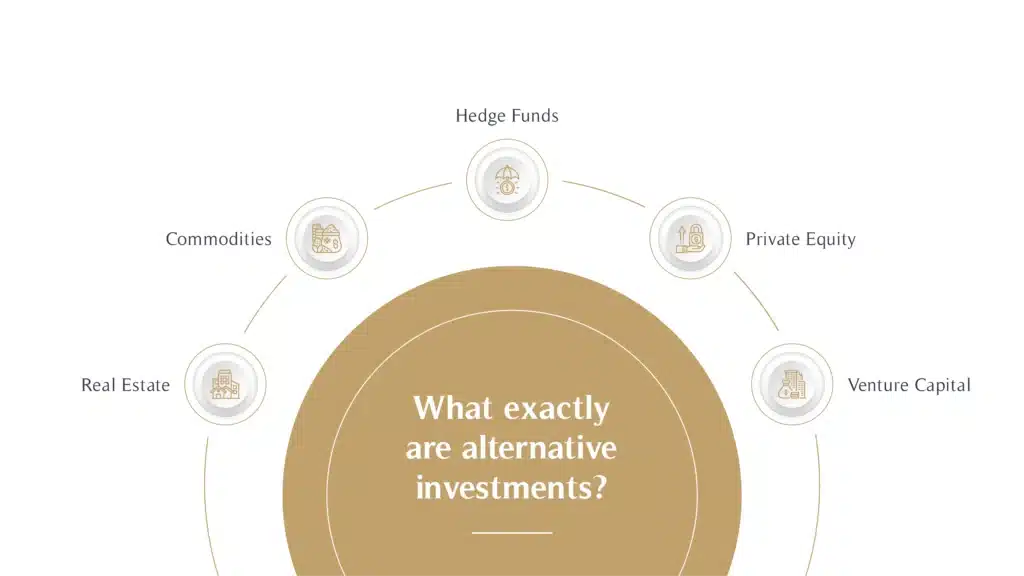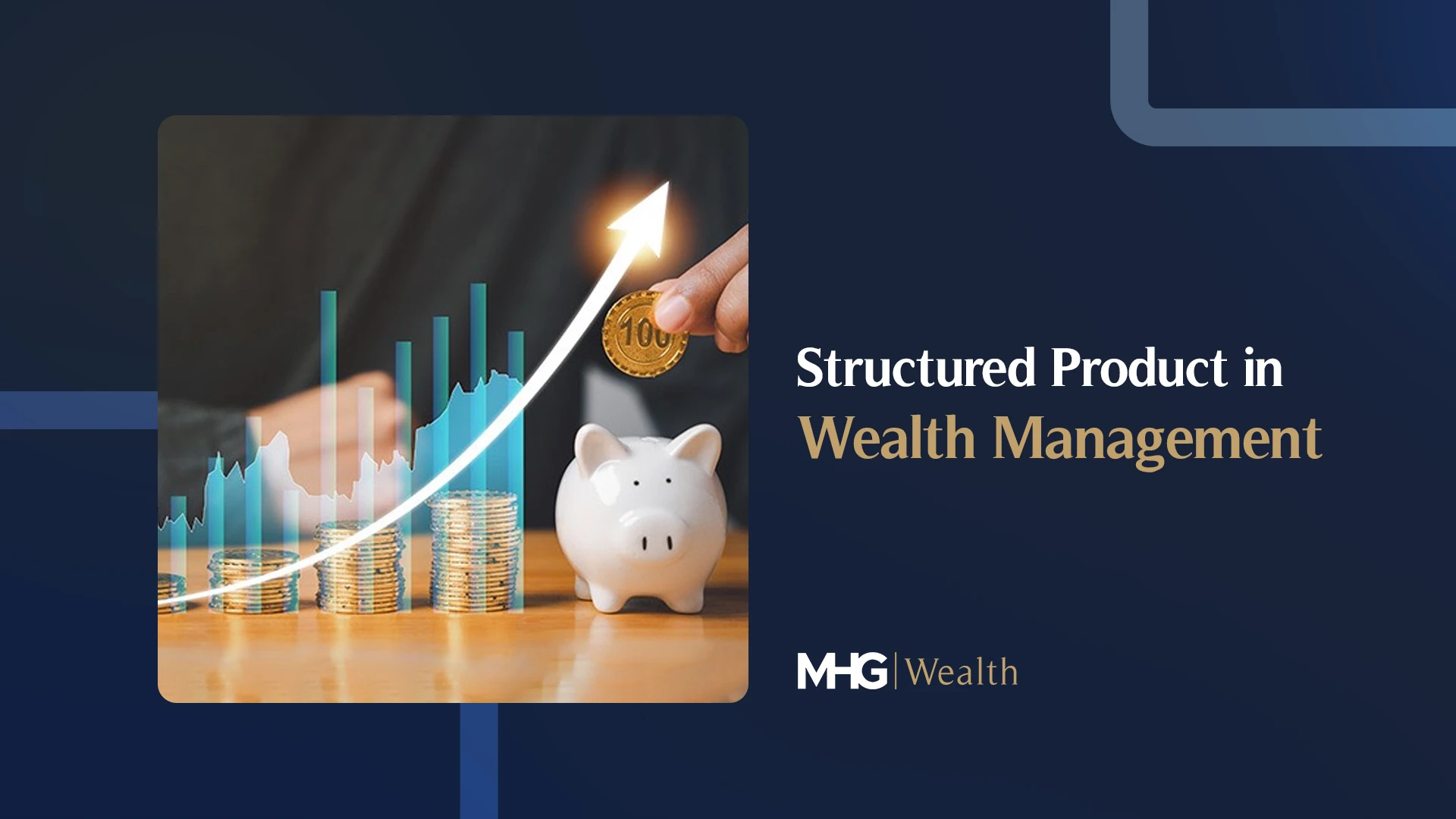People often ask how to invest in alternative investments – or alternative assets. First of all – what are alternative investments? They are usually non-standard investment ‘vehicles’ that are different to the more traditional investments like stocks and bonds. This includes real estate, commodities, hedge funds, or private equity – or even investments like whisky or stamps!
They offer useful portfolio diversification and can give you some impressive returns, they also come with some unique risks. In this guide, we’ll explore different alternative investments, their characteristics and strategies for how to invest in alternative investments.
What exactly are alternative investments?

Real Estate: Investing in properties can provide rental income, capital appreciation, and tax benefits. However, real estate investments can be illiquid and subject to market fluctuations.
Commodities: Investing in commodities like gold, oil, or agricultural products can hedge against inflation and provide diversification. However, commodity prices can be volatile and subject to geopolitical events.
Hedge Funds: These professionally managed funds use various strategies to generate returns, often aiming for absolute returns regardless of market conditions. Hedge funds can be complex and have high minimum investment requirements.
Private Equity: Investing in private companies can offer the potential for high returns, but it also involves significant risks and illiquidity.
Venture Capital: A type of private equity that focuses on investing in early-stage companies. Venture capital investments are highly risky but can offer substantial returns if successful.
Different investment characteristics
Alternative investments have different risk-reward characteristics to more traditional stocks and bonds..
Firstly, there is the question of illiquidity. When you invest in alternative investments, you generally have limited opportunities to liquidate your holdings.
Then there are limited partnership structures. Alternative investments are commonly set up as investment funds structured as limited partnerships, where the general partner issues and manages the fund, and the limited partners are the investors.
There are also investor limitations. Alternatives are typically limited to ‘accredited’ or ‘professional’ investors, and often subjected to minimum investments that typically require $100,000 or more and can be as high as $10 million.
What’s more, alternative investments are rarely perpetual and are typically designed for a 10-12-year life.
How to invest in alternative investments?
Investing in alternative assets is not as complex as you might think. It will, however, vary depending on the type of asset and investment strategy.
The questions should you ask
What is my risk tolerance? Assess your risk tolerance to determine if alternative investments align with your investment goals.
Will it help with my diversification? Alternative investments can help diversify your portfolio and reduce overall risk – but you still need to think strategically..
What about liquidity? How easy will it be to get my money out again? Some alternative investments, such as private equity, can be very illiquid, making them difficult to sell your investment quickly. Others need specialist markets with limited access to
What are the fees and expenses? Alternative investments often come with higher fees and expenses compared to traditional investments.
Do you have the right knowledge and expertise? When you invest in alternative assets you are going to need more specialised knowledge – if you don’t, you will need professional guidance.
Strategies for alternative investments
Indirect Investments You could consider investing in alternative investments through mutual funds- or ETFs. These specialise in this kind of asset classes and can give you the diversification and professional management you need.
For more experienced investors, direct investment in alternative assets can offer greater control and potentially higher returns. However, it also involves higher risks.
Real Estate Investment Trusts (REITs) allow you to invest in a portfolio of real estate properties without owning them directly.
Commodity ETFs are Exchange-traded funds that track commodity prices and can give you exposure to commodities without actually owning physical assets. While investing in hedge fund indices can provide exposure to a diversified portfolio of hedge funds.
How to Approach Investing in Alternatives
Investing in alternative assets can diversify your portfolio and enhance your long-term financial strategy. However, it requires a structured approach and a clear understanding of your goals.
Here’s a detailed guide to crafting an effective investment strategy:
Understand Your investment objectives and time horizon
The first step in any investment strategy is understanding your why. What are your financial goals? Are you seeking steady income, capital growth, or diversification?
- Short-Term Goals: If you need liquidity within a few years, alternative investments with long lock-up periods, such as private equity or private credit strategies, may not be suitable.
- Long-Term Goals: Long-term investments often excel when paired with a patient, forward-looking approach. For example, private equity or real asset strategies like infrastructure projects typically require holding periods of 7–10 years or more to realise returns.
Your investment objectives will guide your decisions about asset allocation, helping you build an investment portfolio that aligns with your time horizon and financial needs.
Explore the differences between traditional and alternative investments in Alternative Investments vs. Traditional Investments.
Portfolio Allocation and Risk Management
Allocating alternative investments within your portfolio is a balancing act. While these assets offer higher returns, they often come with increased risks and illiquidity.
- Aggressive Investment Mix: Includes high-risk, high-reward options like venture capital or hedge funds. Ideal for investors with a high-risk appetite.
- Conservative Portfolio: Focuses on stable, income-generating assets like real estate or REITs, suitable for those seeking steady returns with lower volatility.
Diversifying within alternative investments is also crucial. For instance, blending private equity with real assets or commodities can help mitigate risks and optimise returns.
Learn more about balancing risks with diversification in our guide on What Is Diversification in Investing?
Leverage Professional Expertise
Alternative investments are often complex, requiring specialised knowledge and insights. Partnering with professionals can make a significant difference.
- Manager Research Teams: These experts conduct due diligence, identifying opportunities aligned with your asset allocation goals.
- Portfolio Construction Teams: They structure your investments to ensure diversification, balancing growth potential with risk management.
By working with professionals, you can make informed decisions while navigating the unique challenges of alternative assets.
Consider Liquidity and Lock-Up Periods
Liquidity is a key factor in alternative investing. Unlike traditional assets such as stocks, alternative investments often have limited liquidity:
- Private Equity and Private Credit: Typically require 7–10 years of commitment.
- Real Assets: May take years to sell or generate returns.
Ensure your liquid assets can cover short-term financial needs while your alternative investments mature.
Strategies for alternative investments
Here are some common strategies to consider:
- Private Equity: Invest in privately held companies for high-growth potential. These opportunities often require significant capital and long lock-up periods.
- Real Asset Strategies: Tangible investments like infrastructure and natural resources offer inflation protection and portfolio diversification.
Commodity ETFs: Provide exposure to commodities without directly owning physical assets, making them a simpler way to diversify.
Conclusion
To invest in alternative investments successfully there are a few things to keep in mind before you take advantage of some exceptional opportunities.
Make sure you do your research. You are going to have to thoroughly research any alternative investment before you invest. You need to understand the risks and the underlying assets clearly.
Make sure you diversify within alternatives. Yep. Don’t put all your eggs in one basket. Diversify your alternative investments – even within your alternatives portfolio – to help you manage the risk.
Be patient and stay informed. The alternative investment markets have a longer holding period and may not provide immediate returns – so you may have to wait for results. While you wait, you should keep up-to-date with market trends and economic developments that may affect your alternative investments.
Speak to a professional. Because remember – investing in alternative assets involves risks, and past performance is not indicative of future results. So you should always consider seeking help of financial advisors from someone with specialist experience in alternative investments.
Take advantage of smart alternative investment opportunities today and get in touch with the team at MHG Wealth Management to find out how.
FAQs
How do I get into alternative investing?
Start by defining your financial goals and risk tolerance. Research various asset classes, such as real estate, private equity, or commodities, and consider consulting a financial advisor to develop a tailored strategy.
Where can I buy alternative investments?
Alternative investments are typically available through specialised platforms, private equity firms, or financial institutions. For simpler options, you can explore mutual funds or ETFs focused on alternative assets.
What is the best alternative investment?
The “best” investment depends on your goals. For growth, private equity or venture capital might be ideal. For stability, consider real estate or REITs. Always align your choices with your risk appetite and time horizon.
Where can I invest in alternative assets like private equity and hedge funds?
Many financial institutions and private equity firms in the UAE offer access to these investments. Research platforms or consult your financial advisor for credible options.





